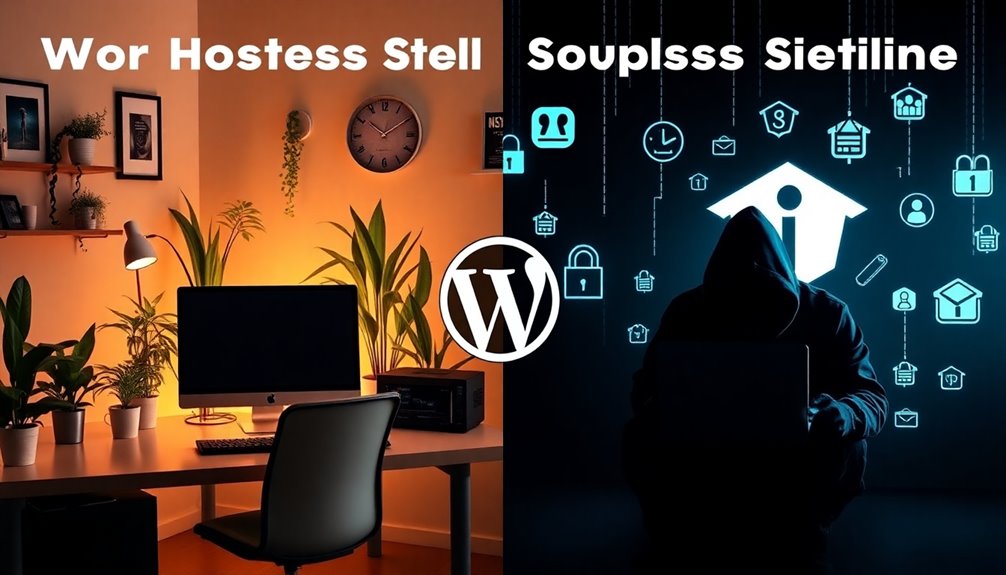Self-hosting on WordPress offers you complete control and customization, letting you tailor every aspect of your site. You'll own your data, avoiding arbitrary takedowns. However, it comes with responsibilities like security management, regular updates, and backups, which can be time-consuming. While costs can start low, they may increase with premium themes and maintenance, so budgeting is essential. You also gain access to powerful e-commerce functionalities and advanced SEO tools, enhancing your site's potential. Weigh the autonomy against these challenges, and you might find there's more to explore about your options and strategies.
Understanding Self-Hosting
Understanding self-hosting is essential for anyone looking to build a WordPress site. When you choose self-hosting, you'll need to purchase a domain name and web hosting, typically costing around $110 per year.
This option gives you complete control over your site, allowing for extensive customization options, like themes and plugins, to create a unique online presence. However, it also means you're responsible for website maintenance, updates, and backups, which can be challenging, especially for beginners. Additionally, it's important to consider the benefits of managed hosting, as they can significantly enhance your site's security and performance. Implementing a strong password policy is crucial for safeguarding your site from unauthorized access.
You'll own your data, reducing risks of arbitrary takedowns from third-party platforms. On the plus side, self-hosting can enhance your SEO capabilities, improving user engagement. Additionally, be prepared to implement security measures to protect your site from potential threats.
Just remember, you'll need to navigate security measures and technical issues independently.
Full Control Over Your Site
When you self-host your WordPress site, you gain complete ownership of your data, which means you won't have to worry about arbitrary takedowns. You can customize every detail, from themes to plugins, giving you the freedom to create a unique experience for your visitors. Plus, you can enhance your site's security and manage backups according to your specific needs, ensuring it runs smoothly and safely. Additionally, having regular backups in place can significantly reduce the risk of data loss and streamline restoration in emergencies. Regular backups act as a critical protection measure against unexpected incidents that could compromise your website's integrity, particularly when you consider the fact that data loss incidents occur every 53 seconds.
Ownership of Website Data
Owning your website data gives you unparalleled control and freedom over your online presence.
With self-hosting on WordPress.org, you retain full control over your website data, free from the restrictions imposed by a hosting provider like WordPress.com. This means you can manage your content, design, and functionality as you see fit, allowing for custom coding and seamless integration of plugins.
You can also export or migrate your data without the risk of losing followers or content. Additionally, owning your website data enables you to implement advanced SEO tools and analytics, boosting your site's visibility and performance.
Ultimately, this level of website ownership lets you choose your hosting provider, ensuring flexibility and security for your online projects.
Customization Freedom
With self-hosting, you gain complete customization freedom for your website, allowing you to tailor every aspect to fit your vision.
You have complete control over which themes and plugins to use, even those not available on managed platforms. This flexibility lets you modify the site's code directly, ensuring it meets your specific business needs or personal preferences.
You can create custom post types, taxonomies, and user roles, enhancing site management and organization.
Self-hosting also lets you integrate advanced tools and features, like custom analytics scripts, essential for targeted marketing.
Plus, you can implement any monetization strategies you choose, maximizing your potential revenue without restrictions from hosting plans.
Embrace the freedom self-hosting offers!
Enhanced Security Measures
While self-hosting your WordPress site, you gain unparalleled control over its security measures, allowing you to tailor protections specifically to your needs.
You can choose from a variety of security plugins, like Wordfence or Sucuri, which offer real-time threat detection and custom firewall protection.
With self-hosting, you're responsible for regular updates to WordPress core, themes, and plugins, enabling you to quickly address any vulnerabilities.
You can also enhance your site's security by obtaining an SSL certificate, enforcing HTTPS for better data encryption.
Additionally, self-hosting lets you create custom security configurations, such as limiting login attempts or enabling two-factor authentication, giving you full control over your website's defenses against potential threats.
Customization and Flexibility

Customization and flexibility are hallmarks of self-hosting with WordPress.org. You gain complete control over your website design and functionality, choosing from thousands of themes and plugins to create a site that meets your unique needs.
With self-hosting, you can implement custom code and advanced features like membership systems or unique eCommerce solutions, which are often limited on managed platforms. This freedom allows you to craft a personalized user experience by integrating analytics tools, enabling data-driven decisions. Many of the best customizable WordPress themes, such as Astra and Divi, offer extensive options for tailoring your site. Additionally, utilizing SEO plugins can help enhance your site's performance and searchability.
You can also modify server settings for performance optimizations, enhancing site speed and overall user experience. Plus, you can implement custom monetization strategies without revenue sharing, maximizing your earnings through ads and affiliate marketing. Additionally, leveraging SEO optimization plugins can significantly improve your site's visibility and search rankings.
Cost Considerations
When you consider self-hosting your WordPress site, you'll face initial setup expenses like domain registration and hosting fees. Ongoing costs can vary based on your needs, from basic plans to more robust managed hosting options. It's important to weigh these expenses against the potential long-term savings and benefits of having complete control over your site. Additionally, choosing a hosting plan that is optimized for WordPress can significantly impact your site's performance and reliability. Many hosting providers, like Bluehost, offer pre-installed WordPress solutions that simplify the initial setup process. To enhance your site's performance, look for features like reliable hosting provider options to ensure uptime and support.
Initial Setup Expenses
Setting up a self-hosted WordPress site typically costs between $110 and $150 per year.
These initial setup expenses usually cover domain registration, which averages $10 to $20 annually, and hosting fees that can start as low as $2.99 per month.
Keep in mind, if you opt for premium themes or plugins, these can add anywhere from $30 to several hundred dollars to your budget.
You'll also need to take into account SSL certificates; some hosting providers offer them for free, while others may charge up to $100 yearly for premium options.
Finally, don't forget to budget for ongoing maintenance and security measures, as these costs can impact your overall investment in your website.
Ongoing Hosting Costs
While you've accounted for the initial setup expenses of a self-hosted WordPress site, it's important to recognize that ongoing hosting costs can also add up considerably over time.
You'll typically pay between $3 to $10 monthly for hosting and an additional $10 to $15 annually for domain registration.
If you opt for premium themes or plugins, expect to spend anywhere from $30 to $300 each.
Maintenance costs, including backups and security, can run you $100 to $300 yearly.
Don't forget about SSL certificates; they can be free or cost up to $200 annually for added security.
Security Responsibilities

Since self-hosting on WordPress places the responsibility for security squarely on your shoulders, it's crucial to implement robust measures to protect your site.
Start by ensuring regular updates for your WordPress core, themes, and plugins to defend against security threats. You also need to secure your hosting environment; this includes configuring firewalls and monitoring for suspicious activities. Proactive security practices can help mitigate risks effectively. Utilizing MalCare Security Plugin can provide powerful malware scanning and firewall protection.
Regular backups are a must, ideally on a daily or weekly basis, so you can recover data in case of breaches.
Don't forget to implement SSL certificates to encrypt data transmitted between users and your website.
Staying informed about the latest security threats and applying necessary security patches promptly can greatly reduce the risk of compromised websites and data breaches. Additionally, utilizing security plugins can significantly enhance your site's defenses against potential vulnerabilities.
Maintenance and Updates
Maintaining a self-hosted WordPress site requires your attention to updates and regular upkeep to guarantee peak performance.
You'll need to manually handle updates for the WordPress core, themes, and plugins, which can be time-consuming. Neglecting these updates may lead to outdated software and potential security vulnerabilities.
Regular maintenance tasks include creating backups, monitoring for security issues, and ensuring compatibility between plugins. These are essential for your website's stability.
You also bear the responsibility for resolving any technical issues that arise, like plugin conflicts or site downtime, which can be stressful if you lack technical expertise.
Investing in reliable backup solutions and security plugins can streamline maintenance efforts, helping to mitigate risks associated with self-hosting for a smoother user experience.
Performance Optimization

When it comes to optimizing performance on a self-hosted WordPress site, you have the advantage of tailoring your setup to meet your specific needs.
Self-hosting lets you choose a hosting provider that prioritizes performance optimization, like SSD storage and high bandwidth. You can implement performance-enhancing plugins, such as caching tools, to drastically reduce page load times.
By controlling server settings, you can enable Gzip compression and utilize Content Delivery Networks (CDNs) for faster content delivery. Regular performance monitoring through tools like Google PageSpeed Insights helps you make ongoing adjustments.
Plus, self-hosting offers scalability options, allowing you to allocate resources effectively as traffic grows, without the limitations of shared hosting environments.
Learning Curve for Beginners
When you start with WordPress self-hosting, the initial setup can feel overwhelming, especially if you're unfamiliar with domain registration and web hosting.
You'll need to build your technical skills to handle updates, backups, and troubleshooting on your own.
While there are plenty of resources available, using them effectively is key to overcoming these challenges.
Initial Setup Challenges
Although diving into self-hosting WordPress can be exciting, many beginners quickly realize that the initial setup presents a significant learning curve.
You'll need to tackle the manual install of WordPress, which can be intimidating if you're unfamiliar with web hosting and file management. Choosing a suitable hosting provider is another challenge, with costs ranging from $3 to $10 per month, making budgeting essential.
Once you've set up your hosting, configuring settings like permalinks and security measures requires careful attention. Maneuvering the WordPress dashboard and learning to use plugins and themes can feel overwhelming too.
Thankfully, extensive online resources, such as tutorials and forums, are available to help you overcome these initial setup challenges.
Resource Availability
Steering through the world of self-hosting WordPress can be intimidating, especially for beginners who face a steep learning curve.
You'll need to develop essential technical skills for managing hosting, domain registration, and software installation. While there are plenty of free resources and tutorials available, traversing them can feel overwhelming if you're not familiar with web development concepts.
Self-hosting demands a solid understanding of server management, security protocols, and troubleshooting, which may challenge those with limited technical backgrounds.
Fortunately, many website owners find help in community support forums like WPBeginner, although the effectiveness of these resources can vary based on your learning style.
Technical Skills Requirement
Maneuvering the technical skills required for self-hosting WordPress can feel overwhelming, especially if you're new to web development.
You'll need a fundamental grasp of web hosting, domain registration, and server management, which can be intimidating. The installation process involves configuring databases and file permissions, presenting a significant learning curve.
Managing plugins and themes is essential, as improper installations might lead to performance issues or conflicts. Regular maintenance tasks, including backups and updates, demand ongoing technical knowledge to keep your site secure.
Many beginners find learning coding basics or using FTP for file uploads challenging, which might deter you from pursuing self-hosting. However, overcoming these hurdles can empower you to create a customized online presence.
Scalability Options

When you choose to self-host your WordPress site, you access a world of scalability options that can adapt to your growing needs.
Unlike WordPress.com's fixed plans, self-hosting lets you upgrade your hosting as your traffic and resource needs expand.
Here are three key scalability options:
- Flexible Hosting Providers: You can select from various hosting providers, ranging from budget shared hosting to high-performance managed hosting.
- Performance Optimization Plugins: Easily integrate plugins to enhance speed and support more visitors.
- Expanded Functionalities: Incorporate eCommerce functionalities and membership plugins, allowing you to diversify services and increase revenue.
Data Ownership Benefits
When you self-host with WordPress.org, you gain complete control over your website data, which means no one can arbitrarily remove your content.
This ownership protects you from takedown risks and lets you manage your data as you see fit.
Plus, you can easily back up your information in any format you prefer, giving you the flexibility to adapt to your needs.
Complete Control Over Data
One major advantage of self-hosting with WordPress.org is that you gain complete ownership of your website and its data.
This autonomy empowers you to make vital decisions regarding your content and user data without the constraints of platform policies.
Here are three key benefits of this control:
- Customizable Data Storage Solutions: You can choose hosting providers and plans that fit your needs and budget.
- Enhanced Security Measures: You manage your own backups and security, keeping your content safe and retrievable.
- Advanced Analytics Tools: You can implement tracking tools for deeper insights into site performance and visitor behavior.
With self-hosting, you guarantee your data remains yours, allowing for greater flexibility and security.
No Takedown Risks
Self-hosting your WordPress site not only grants you complete control over your data but also eliminates the anxiety of potential takedowns.
With self-hosting, you own your content management system, so you won't face arbitrary restrictions due to platform violations or sudden changes regarding service. This ownership allows for unrestricted growth, as you're not limited by storage or bandwidth constraints typical of lower-tier plans.
Plus, you can implement any monetization strategy you desire without sharing revenue or incurring platform fees, maximizing your earning potential.
Should you ever need to switch hosts, data migration is straightforward, ensuring your online presence remains intact and freeing you from vendor lock-in concerns.
Enjoy your independence with self-hosting!
Plugin and Theme Availability

The world of self-hosted WordPress opens up a treasure trove of plugin and theme options that can elevate your website's functionality and design.
With WordPress.org, you gain access to over 58,000 free plugins and thousands of premium themes, ensuring extensive customization.
Here are three key benefits:
- Diverse Options: Choose from a vast theme repository and premium themes from third-party providers to match your brand.
- Advanced Functionality: Install any plugin you need for SEO, eCommerce, or performance optimization, unlike lower-tier plans on WordPress.com.
- Creative Freedom: Work with plugin developers to create custom solutions or modify existing ones, fostering innovation tailored to your business needs.
Self-hosted WordPress truly empowers your creative vision!
Support and Community Resources
With a robust selection of plugins and themes at your fingertips, self-hosted WordPress also connects you to an expansive support network.
The WordPress community is one of the largest, offering a wealth of resources like blogs, forums, and tutorials for troubleshooting and learning. You can engage with online platforms such as WPBeginner for beginner-friendly guides, or explore YouTube tutorials and social media for tips on maintenance and development.
WordCamps and other physical events provide excellent opportunities for networking and knowledge-sharing among users and developers.
This community-driven support enhances your experience, promoting collaboration that leads to continuous improvement and innovation in WordPress resources.
You'll never feel alone on your self-hosting journey!
E-Commerce Capabilities

While exploring e-commerce options, you'll find that self-hosting WordPress offers incredible flexibility and control.
With powerful plugins like WooCommerce, you can tap into extensive e-commerce capabilities, enabling you to create a unique online store tailored to your brand.
Here are some key benefits:
- Customizable Payment Gateways: You can choose from various payment gateways, keeping all revenue without sharing it with a platform.
- Diverse Business Models: Self-hosting allows you to implement different business models, from traditional sales to subscriptions and memberships.
- Analytics Insights: Access to tools like Google Analytics lets you track consumer behavior and optimize your sales strategies effectively.
This combination of features empowers you to build a robust online presence that meets your specific business needs.
Potential Technical Issues
Running a self-hosted WordPress site gives you remarkable control, but it also comes with potential technical issues that can be challenging to navigate.
You might face plugin conflicts that disrupt functionality or even block admin access. High traffic spikes, often from bot activity, can overwhelm your server, requiring manual intervention to keep your site running smoothly.
Minor errors like incorrect file extensions can frustrate you, especially if you lack technical expertise. During host transfers, complications can arise, frequently due to the hosting provider instead of WordPress itself.
Finally, regular maintenance is your responsibility; neglecting updates could expose your site to vulnerabilities and security threats. Staying proactive is key to minimizing these challenges.
Comparison With Managed Hosting

When considering self-hosting versus managed hosting for your WordPress site, it's vital to weigh the trade-offs between control and convenience.
Here are three key differences:
1. Control and Customization: Self-hosting gives you complete control over your website data and allows unrestricted use of plugins and themes.
In contrast, managed hosting often imposes limits to guarantee peak performance.
2. Cost: Self-hosting can start as low as $3/month, while managed hosting typically costs around $30/month.
3. Technical Support and Updates: Managed hosting provides automated updates and professional technical support, relieving you of maintenance tasks.
With self-hosting, you're responsible for updates and troubleshooting, which can be intimidating without technical knowledge.
Conclusion
When you weigh the pros and cons of self-hosting WordPress, remember that about 30% of all websites on the internet use this platform, showcasing its popularity and potential. While you gain full control and customization, you also take on security and technical responsibilities. If you're ready to plunge into the world of self-hosting, just know that the rewards can be great, but so can the challenges. Choose wisely, and you could create something truly unique!



